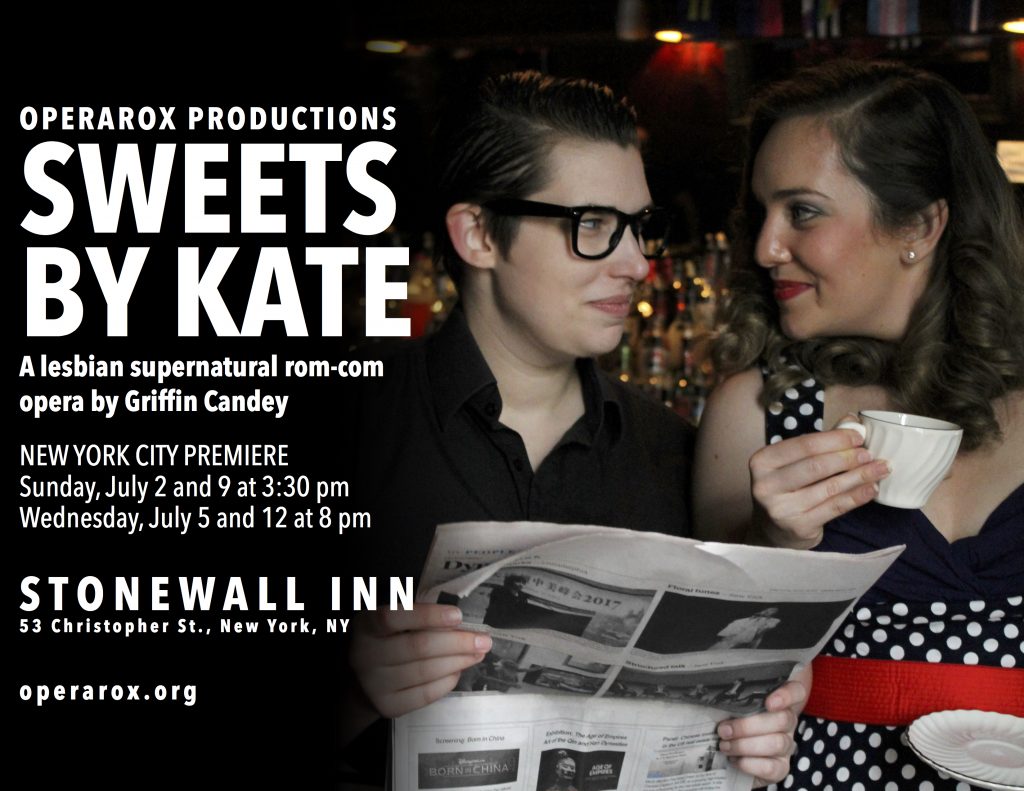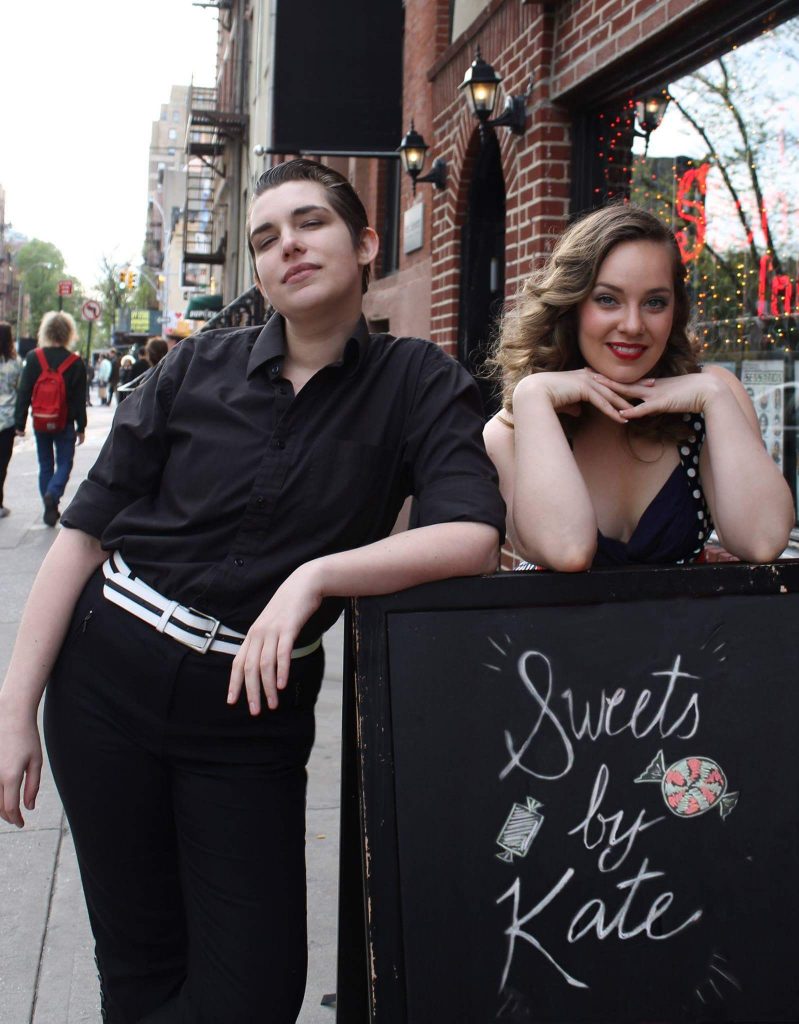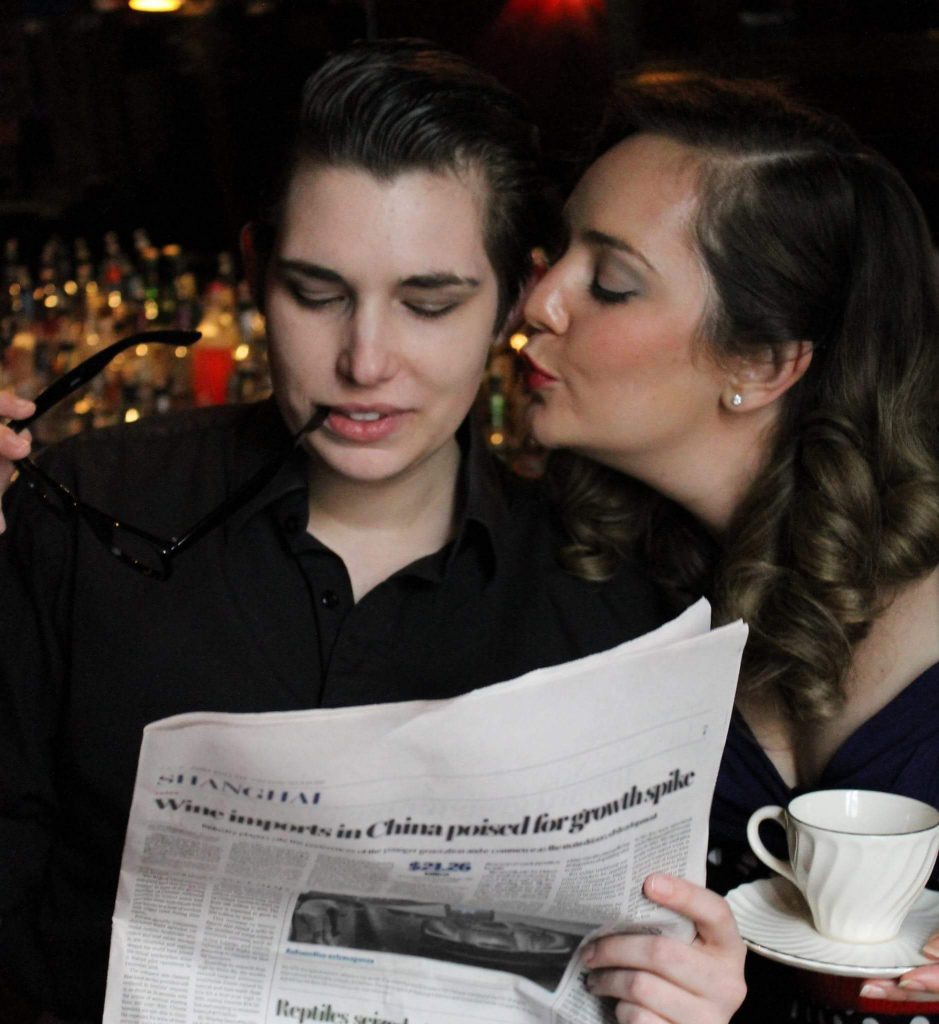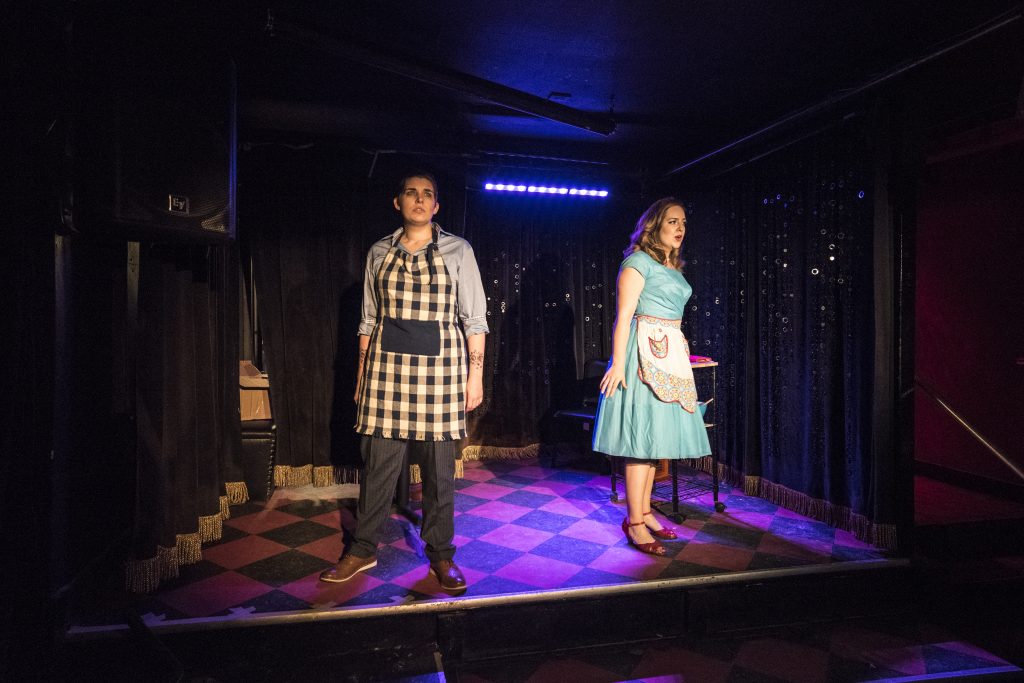Editor’s Note: My unending thanks to guest authors Molly Pinson Simoneau and Michael Oberhauser for interviewing, writing, and editing this interview with Kim Feltkamp and Griffin Candey. The work we do together is always greater than the sum of its parts. – MI
“Sweets by Kate” — Heartfelt Opera Making
In 2015 OperaRox Productions, a fledgling opera company formed by Kim Feltkamp and a group of talented friends who mostly knew each other from Tumblr and Twitter, debuted with a fully-staged performance of Le Nozze di Figaro. Now, just two years later, they are presenting a sold-out run of Griffin Candey’s original opera Sweets by Kate at the historic Stonewall Inn, and turning the heads of New York arts fans with their enthusiastic and heartfelt opera making.
As fellow independent opera creators, my friend, composer Michael Oberhauser, and I were eager to learn from the work that OperaRox is doing. We interviewed producer Kim Feltkamp (who also performs in Sweets by Kate,) and composer Griffin Candey, via email to find out why they do what they do, and what they’re doing right. Their responses have been lightly edited for clarity and brevity.
There is a lot of talk in the opera community and the wider classical music community of “if you don’t see the opportunities that you are seeking, make them yourself.” And I think OperaRox is a really good example of not just doing exactly that, but doing it successfully. I’d like to hear a little bit about how you built this opera company from scratch, mostly drawing on an online community of opera artists. How do you go from chatting online about “wouldn’t it be cool if we just put together a production of Marriage of Figaro?” to actually making it happen?
Kim Feltkamp: I can’t help laughing thinking about how Figaro came together. It was about as scrappy as you can get. I think the best visual I have (that basically sums up the entire experience) is [baritone] Michael Hofmann in a “Sashay Away” tank singing the Count’s Act III aria from the pulpit of the Lutheran church where my parents had gotten married 30 years prior.
I fully believe that you should create the things you want in the world. Jaimie Appleton, the other founder, was the one who reminded me of this. I’d just recovered from a two year battle with a monstrous virus that left me bedridden and unable to cut my dinner, much less sing, and I really wanted to do something crazy. There was this fire that had been building in my chest throughout my sick leave and I just had to let it out. So I put together a production of Figaro and recruited people I’d met online or in real life. It wasn’t really “wouldn’t it be cool” as much as “I’m doing this; do you want to do it with me?” Despite the stereotype, opera singers are hardy people and game for almost anything. They threw themselves into the project without promise of pay or anything except the chance to perform.
It wasn’t really “wouldn’t it be cool” as much as “I’m doing this; do you want to do it with me?” Despite the stereotype, opera singers are hardy people and game for almost anything – KF
We raised the shoe-string budget via crowdfunding. That’s where the OperaRox online community really came into play. They hyped and supported the project throughout, leading to a sold out run. I had no plans at the start of putting on another opera after this singular experiment, but after the experience and the ensuing response, I began to consider OperaRox as a real company. [Soprano] Devony Smith, our Susanna and a fellow Bard alum, was the one who really put the possibility in my head and helped shape the company moving forward
Finding artists and creatives is usually the easy part. What about the less glamorous aspects? Can we talk about money? Even in the instances where you can get creative people to work for free, venues and rehearsal spaces generally aren’t free – and there are a million other costs that always seem to pile up. Can you touch on some of these administrative challenges?
KF: Of course there’s a certain amount of “nitty gritty” administrative work that goes into any opera company, but it’s definitely more of a challenge when you don’t have hired staff or helpful technology to ease things along. Honestly, our greatest asset on this end is Fractured Atlas, our fiscal sponsor.
As I’m sure any arts company will tell you, fundraising is difficult and unpredictable. There’s no surefire road to success. (If I’m mistaken on this, please write me and share your secret!) But being part of Fractured Atlas allows us to apply for grants and offer tax-deductible donations among other things. Again: this is a huge help to us.
I don’t like to ask people to perform for free. Sometimes it’s necessary (like for our fundraiser salons), but in general I think it only perpetuates this awful trend of not paying artists simply because society doesn’t see it as a capitalistic endeavor worth actual money. I aim to pay all of our creative artists — it’s so important that it’s part of our mission statement. I don’t pay them nearly as much as they deserve.
This is a challenge that I think every artist is familiar with, but I’d like to hear your approach to making good art with limited resources. Was Sweets by Kate created with that inevitability in mind? How would this show look (and sound? and feel?) if the fairy opera godmother gave you everything you could have wanted? Can limitations sometimes be a creative advantage?
Griffin Candey: Yeah, there’s that whole Stravinsky quote about forcing limitations on yourself to make creation happen in a more fruitful way, something like that, and I totally subscribe to that sentiment. Sweets was absolutely created with some slimness of resources in mind, having been written for a small young artist program and being a fairly petite show. Thom and I very specifically built it around a unit set, a small(ish) cast of characters, and fairly few technical requirements — there are plenty of props necessary, but they’re things like mixing bowls and little bottles, not large stone obelisks or volcanos or something.
KF: With more money, the very first thing I’d do is pay our artists more. Then I’d spend more money on props and whatever the director wanted to make the production more realistic or closer to their vision.
GC: Unlimited candy. This show has a lot of baked goods, and there’s so many wonderful bakeries in NYC — I’d love to have the stage full of actual wonderful macaroons and things in every performance! (I’m not sure that any of our waistlines would agree, but it’d still be fun.)
Griffin, what kind of collaborative relationship do you have with librettist Thom K. Miller? What was the process like for the two of you adapting Sweets by Kate from the original short story?
GC: First of all, an extremely collegial, fruitful, and fun one. This is Thom’s first opera libretto — you wouldn’t guess it — but his personal, first-hand knowledge of theater and music theater as an actor really lends him a huge grasp on tropes, running jokes, set-ups and let-downs, everything. I appreciate librettists who have been in the opera game for a while, but I can also appreciate an intelligent outsider who’s willing to unabashedly step up to the bat in this sort-of oddball genre of ours. Thom was that for me.
I asked, out of the blue, if he’d ever be interested in writing a libretto — he replied, “well, I’ve never done it before, but I’d love to try!” – TM
Tiny anecdote: I met Thom working at an artisan pizza place in grad school. We hosted a ton of concerts there, and he was part of a Christmas cabaret-ish mish-mash of things where he read a monologue about being a bachelor on Christmas and loving being able to ignore everyone and gorge himself on Indian food. The writing was conversational, thoughtful, had the right push-and-pull of detail and action, recurring jokes, et al. I went up to him after and gave him kudos, and asked who wrote the monologue — to which he replied that he had. I asked, out of the blue, if he’d ever be interested in writing a libretto — he replied, “well, I’ve never done it before, but I’d love to try!” (in a very true-to-brand almost-oppressively-positive Thom Miller way, as I would come to find later.)
Sweets by Kate has really had some legs. Do you have any advice for other opera composers to get repeat performances of their works?
GC: I think that there are a crazy amount of elements that play into this, but a few things are pretty key in my mind:
Making the ensemble feasible, both in the orchestra and in the cast. This is sort of the obvious one, but it bears repeating. There are more female singers than male singers — aim for that. Companies, especially smaller and emerging ones, can’t summon up (or afford) big casts and choruses — keep that in mind. Keep your orchestra manageable, don’t write Verdian stuff.
Don’t write in abstentia. This is not always the case outside of the opera world, but here, it’s something that I see as pretty hard and fast. I do not write an opera until I have a company who is 100% committed to performing it, contractually. It’s so tempting to find a story and leap directly into it, write it, have it all packaged, et al. — I’ve seen a folks time and again do that exact thing (with so many excellent stories!) and have those operas sit on the shelf until those people literally die. It’s something that feels like being prompt and ahead of the game, but what it achieves is actually a self-imposed roadblock — it’s like writing a term paper before knowing the prompt. Opera companies want to put on something that is specifically crafted for them, that pays attention to what their audiences want, that fits their spaces, their budgets, and their social aims. Coming to a company will a fully-complete opera, even done intelligently, is simply you asking that company for their money, which is the biggest possible turn off.
Don’t write in abstentia. – GC
The alternative: form relationships with companies and the folks that run them (i.e. go to their performances literally only to enjoy them and to chat, not to pitch anything at anyone, for god’s sake,) let them get to know your work in other ways, then ask them what an ideal commission would look like — cast-wise, length-wise, in what vein of subject matter, et al. It’s an exercise in restraint, but extremely worthwhile in the long run. It allows the company to be part of the creation process, which makes them more invested in the project as a whole, which makes them more excited to tell other folks about this opera, which lead to the next point.
Beyond that point: there’s no perfect formula to make your opera boat keep floating downstream to more companies. After the premiere, plug any leaky holes, trim and tweak, make it its most solid self. There are many avenues to getting a work performed further (different showcases, like Hartford Opera Theater’s New in November or Fort Worth Opera’s Frontiers program) and there are luckily even more cropping up all the time.
Representation can be a tricky thing to talk about in any creative process. Most creators can’t make things that have characters that are just reflections of themselves – the vast majority of stories involve characters of varying backgrounds. Similarly, singers can’t always play roles which are reflections of themselves, and a director has to take different perspectives fluidly. How did you prepare to compose, and act in this opera?
KF: I’m glad you asked about representation. I am drawn to this opera for many reasons, but a big one is that I finally get to play a non-male woman-loving character. There are very few lesbian characters in opera, so it’s fantastic to have this opportunity to play a character that’s close to my own personal experience.
Also, if audiences only ever see romantic comedies with straight leads, why should they think of other types of relationships as anything but “other”? Opera, at its core, is about the human experience. So why should we keep showing the same, narrow experience over and over again? – KF
Also, if audiences only ever see romantic comedies with straight leads, why should they think of other types of relationships as anything but “other”? Opera, at its core, is about the human experience. So why should we keep showing the same, narrow experience over and over again? Representation in art is key because it begins to shift society’s conception of normality and opens their minds to a wider realm of experience.
GC: I’ve always vowed to myself, as a white, heterosexual, cisgender male that I would never write an opera about someone like me — not in some sort of flagellating way, but because we don’t need anymore. The vast majority of the canon is about folks like me dealing with upper-middle-class (or higher) “problems,” and tellingly, folks outside of that small ring don’t always connect with opera. What this means for me is, with the deep and thoughtful input of the right folks, helping to highlight the stories of other communities, which always comes with the risk of improper representation, appropriation, an oversimplified take, regardless of the individuals that I work with or the company that produces the works. In an overarching sense, I’d much rather try as a privileged individual to help amplify the stories of communities outside my own and fail than to blithely, easily tell the same tired stories that my (equally-white, equally-male) predecessors have told and have to grow not at all personally.
The venue for Sweets by Kate is iconic; some might even call it Hallowed Ground. What does it mean to you to be performing, and to be performing this piece in particular, at the Stonewall Inn?
KF: Performing at Stonewall is a gift, pure and simple. It was the number one place I wanted to bring this opera and the fact that it’s actually happening is still beyond me. I’m over the moon about it. I don’t think I’ll ever get over it. There just isn’t a more special or more fitting place for this opera and the fact that we could make it happen is a miracle that I will always be grateful for. It is just so special. I get emotional just thinking about it.
GC: I actually still have the voicemail from when Kim called me to tell me that Stonewall had agreed to be our venue. (It is the most delightfully energetic and giddy voicemail. I also was in the kitchen of my day job when I listened to the voicemail, and did a lot of enthusiastic uppercut motions before returning to my tables.)
The perfect venue for the message of this opera: you don’t need anyone’s permission to live the life that you want to live. – GC
I cannot express how meaningful it is to be in this space. This company aims so, so strongly to amplify the voices of the LGTBQ community, and Kim goes big or goes home — there were a heap of other potential venues, but the Stonewall Inn, the epicenter of the Pride movement and activism, leapt out to them as the perfect venue for the message of this opera: you don’t need anyone’s permission to live the life that you want to live. Thankfully and amazingly, Stonewall signed on, and they’ve been unbelievably supportive. I am thankful down to my bones about it.
What’s next for OperaRox? What are your long-term goals for the company?
KF: I have so many plans for OperaRox. The only one I can really talk about right now is the opera we’ve commissioned for next summer. We chose Tony Manfredonia from a long list of submissions that we received after our call for composers and librettists last fall and the opera will deal with the theme of mental health. It’ll be his first full opera and I’m so excited to see what he’ll create.
As for myself, I’ve been focusing on honing my skills as a librettist. I have a few commissions in the works right now and I’ve written the libretto for OperaRox’s opera next season. I’m hoping to have the opportunity to study with some prominent librettists in the coming year.
Kim Feltkamp (Founder, Artistic & General Director) discovered their* passion for opera at a performance of Mozart’s Le Nozze di Figaro in their first semester of college. They just graduated with a M.M. from Dawn Upshaw’s Graduate Vocal Arts Program at Bard College Conservatory of Music, where they played the Pig in Knussen’s Higglety Pigglety Pop! and sang as an alto soloist under Leon Botstein’s baton for Handel’s The Messiah. They received their B.S. in Vocal Performance from Hofstra University. Professionally, they most recently created the lead role of Elizabeth in Griffin Candey’s Sweets by Kate and performed Ottavia in a Baroque gesture production of Monteverdi’s Poppea.
Griffin Candey (b. 1988) is an American opera composer dutifully committed to creating vocal and theatrical works that, by approaching forward-thinking subject matter, aim to both expand and preserve those genres. At the core of Candey’s vocal music is a level of practical vocal finesse that vocalists and interpreters praise for its “prosody that showcases both the words and the singers,” its “intuitive rhythm,” and its “lyricism and emotional depth.”
Molly Pinson Simoneau is a young soprano whose voice has been called “powerful” and “thrilling,” with a silvery tone that finds a balance between dramatic heft and bel canto grace. Her repertoire includes music by Mozart, Puccini, Strauss, Wagner, and many others, and spans opera, liturgical music, and art song.
Michael Oberhauser‘s music has been performed at the Kennedy Center for the Performing Arts, on the Kojo Nnamdi show on WAMU 88.5, by the Silver Finch Arts Collective, by Opera Alterna, by the Ohio Northern University Symphony Orchestra, the Ohio Northern University Singers, and the opera department at the Catholic University of America. Notable commissions include pieces for the University of Maryland Opera Studio and Christian Youth Theater in Chicago. Michael is a composer from Maumee, Ohio.





Brilliant and so on point (as usual)!
Thanks, Mara!